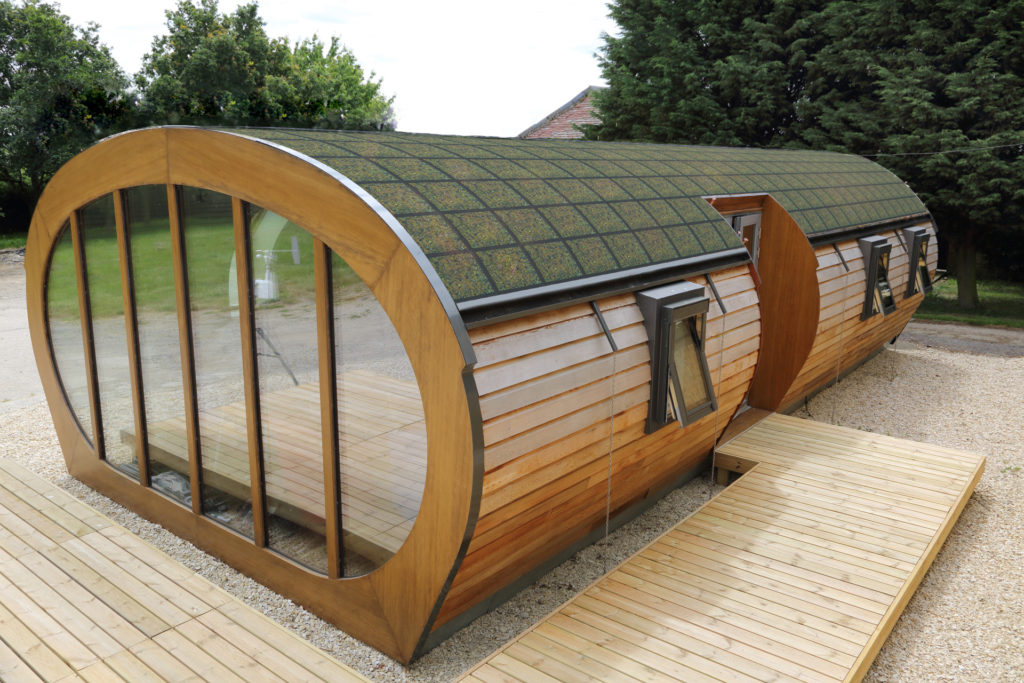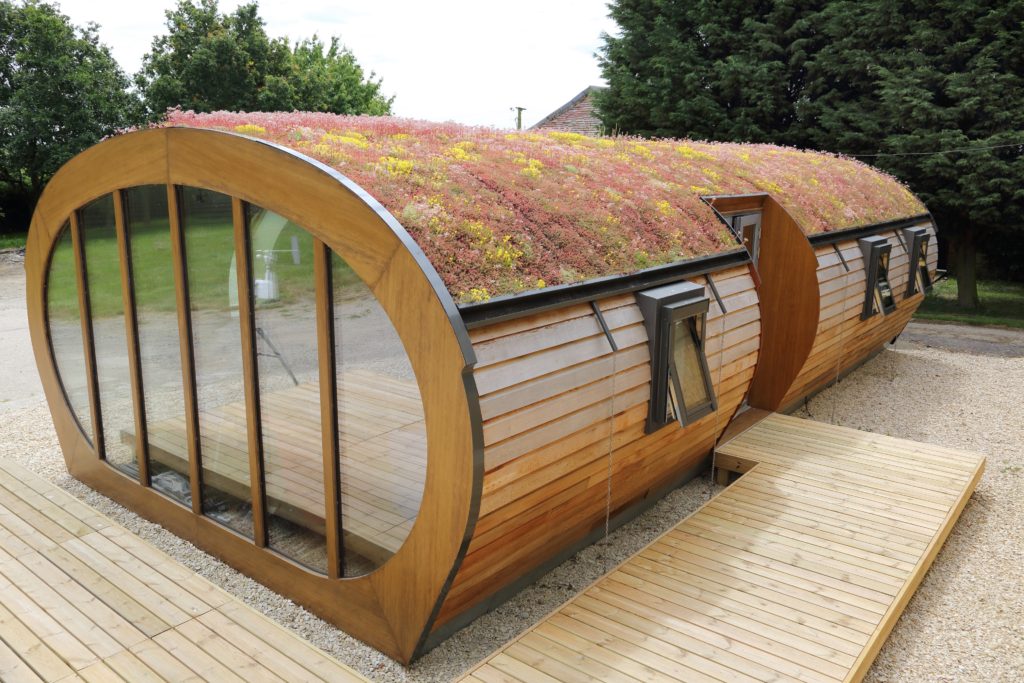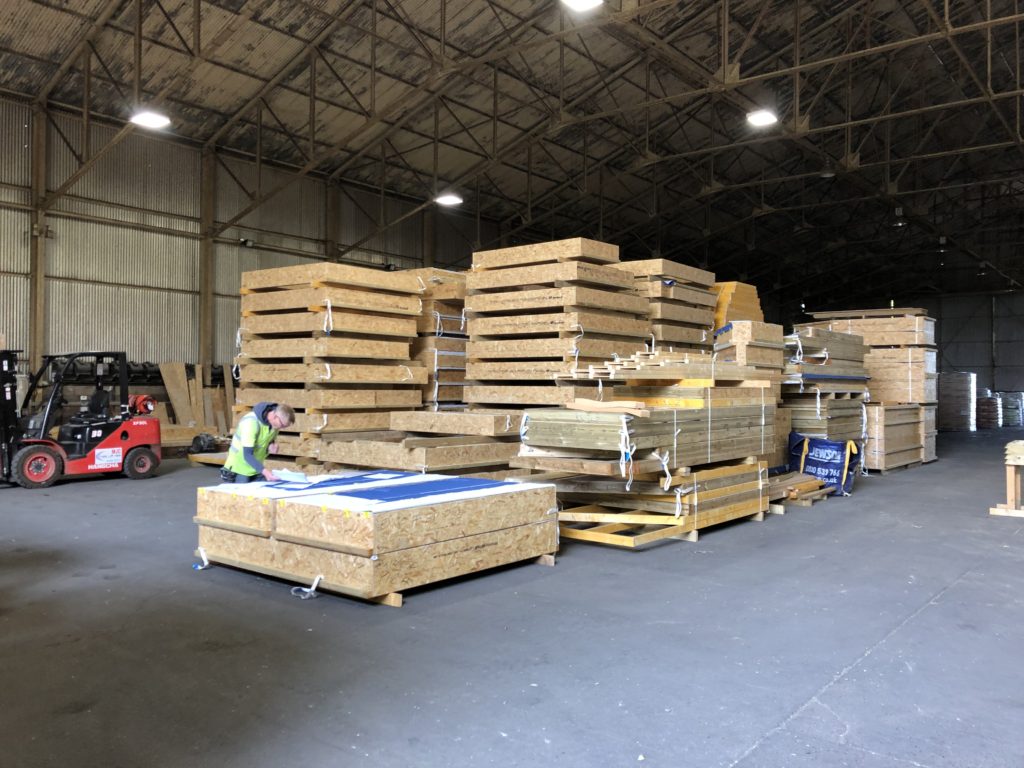Jonathan Finnerty and the Green Unit ARC. Pic: Green Unit
Eco builder’s deal with solar panel maker opens way to place homes at off-the-grid sites
Eco-builder Green Unit has partnered with solar panel manufacturer Verditek, in a deal that opens up the potential to use its buildings in locations with no infrastructure or grid connection.
Verditek’s panels are less than 3mm thick and flexible enough to be wrapped around the distinctive curved roofs of Green Unit’s ARC eco-pods.
The panels, which are six-times lighter than other similar-sized frames, use conventional silicon photovoltaic (PV) technology to harvest the same amount of power from sunlight.
By tapping into Verditek’s solar technology, the ARC eco-buildings will be able to generate their own power. This means the curved pods can be used completely off-grid, including in areas where it’s too expensive or inefficient to supply infrastructure and connections.
Green Unit managing director and co-founder Jonathan Finnerty told TechTribe Oxford: “Our ARC units last as long as any bricks and mortar buildings. But although they are robust and permanent, they can be moved on when necessary.”
He believes a cluster of these eco-buildings on temporarily unused land sites could be used to alleviate homelessness in Oxford and go some way to meeting the government’s target of building 300,000 new homes a year across the UK.
“A patch of land could accommodate 20 of our units and could be providing dignified homes for families or homeless people,” he points out.

How the ARC eco-pod will look with Verditek’s solar panels. Pic: Green Unit
The ARC pods that are fitted with the Verditek solar panels will include battery storage and a bio-generator, so the building can be powered in cloudy conditions.
High-end insulation and airtightness mean it will not take much power to heat or cool the space.
The low-carbon engineered timber ‘pods’ are built offsite at Green Unit’s factory, a former aircraft hangar on Lockwood Farm, next to Culham Science Park.
Its head office in Chiselhampton will eventually be moved to Lockwood.
The ARC units can be fitted out with plumbing, lighting, heating, ventilation, kitchen and bathroom before being craned onto a lorry and transported to wherever needed.
The eco buildings are also used as offices, visitor centres, community buildings, school classrooms and holiday lodges. Google bought one to use at its head office in Kings Cross, London.
Finnerty explains: “The principle of offsite construction is to do as much as possible in the factory.”

Typically, the roof is covered with sedum. Pic: Green Unit
Up until now, all Green Unit’s ARC buildings have had natural, sedum or wild-flower roofs to boost biodiversity and small-scale carbon sinking, and these will continue to be offered as options.
The partnership between the two companies, who are both members of Oxfordshire Greentech, came about after they met at the Cambridge Cleantech event.
https://oxford.techtribe.co/news/oxfordshire-firms-shortlisted-for-cleantech-venture-day/
Speaking about the new partnership with AIM-listed, London-based Verditek, Finnerty says: “Our companies share an ethos around sustainability and design, and strive to offer a building solution to clients that meets the highest form and functional standards.”

Inside the factory at Lockwood. Pic: Gill Oliver
Finnerty describes the deal as “an important step” and adds it is “the first of many” collaborations.
He is already in talks with other cleantech companies interested in using the six-acre Lockwood site as a base to run research and development trials and studies aimed at tackling issues around climate change.
